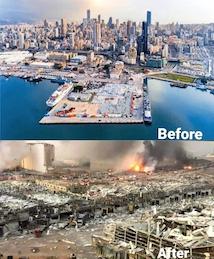The below article was published as a post in the OECD’s Development Matters blog on 15th Sep 2021. The original post can be accessed directly at: https://oecd-development-matters.org/2021/09/15/lebanons-path-back-from-the-brink-of-collapse/
Lebanon’s path back from the brink of collapse
Since October 2019, Lebanon has been in the throes of a historically unprecedented economic and financial meltdown, simultaneously facing a humanitarian crisis, a debt crisis, a banking crisis, a currency crisis, and a balance of payments crisis. The numbers are staggering. Real GDP has declined for the fourth consecutive year by a cumulative 45% since 2018 making it the second most severe financial crisis in history. The Lira has lost 90% of its value, annual inflation is running at 150% and an 80% de facto haircut has been imposed on deposits.
These multiple crises impose terrible human costs. Unemployment exceeds 45% of the population, with 77% in poverty and 40% in extreme poverty. There are basic commodity shortages and long queues for fuel, bread and medicine. Government-provided electricity is rationed at about three hours per day; the majority of the population relies on expensive private generators. The monthly minimum wage is now the equivalent to $40 (below Bangladesh), a soldier’s salary is $76 while a judge earns $247. People seeking to escape have fuelled an unprecedented wave of emigration of professionals (doctors, consultants, engineers and teachers), other skilled workers and youth. Lebanon’s human capital is leaving. The four main pillars of the economy, trade and tourism, health, education, and banking and finance, are being destroyed.
At present, Lebanon, after a thirteen-month deadlock, has formed a new government under Prime Minister Najib Mikati. The priority today is to restore trust and confidence in government and the banking sector.
But first, why and how did Lebanon descend into economic collapse?
Unsustainable monetary and fiscal policies and a highly overvalued fixed exchange rate led to persistent fiscal and current account deficits over two decades. The twin deficits led to a rapid build-up of debt to finance current spending, with negligible build-up of infrastructure or public assets. The Banque du Liban (BDL) paid double-digit interest rates along with massive borrowing to defend the pegged rate. In turn, high interest rates compounded fiscal deficits and debt growth, eventually leading to a financial meltdown, a sovereign debt default, multiple exchange rates, the institution of ineffective informal capital controls, and freezing of deposits, along with restrictions on payments that prompted an evaporation of liquidity.
Combined, these crises have created a vicious cycle. Deep depression and inflation led to a sharp reduction in government revenues, and a rapid increase in the budget deficit financed by the BDL, with monetisation of deficits and debt by the central bank accelerating inflation and depreciation of the black-market rate. The inflation tax reduced real incomes and destroyed the financial wealth of several generations. Layoffs, bankruptcies, and insolvencies, as well as unemployment and poverty rates are spiking. The coronavirus pandemic and lockdowns only exacerbated the crises. The 4 August 2020 Beirut Port explosion – likely the third biggest non-nuclear explosion in history – led to loss of life, mass destruction of infrastructure, housing and businesses, and homelessness.
To address its multiple crises, Lebanon needs a financial package of about US$75bn over the near and medium term: some $20bn for restructuring of the banking sector, in addition to $10bn for restructuring the BDL, $15bn for infrastructure, $10bn for fiscal transition and social protection, $5bn for Balance of Payment support and $15bn for private sector financing. International support from the IMF, the World Bank, the Gulf Co-operation Council, the European Union, the United States, China and Japan are imperative, but will be conditional on Lebanon undertaking a comprehensive set of deep governance, economic, monetary, fiscal and structural reforms, built on four pillars:
- Sustainable public finances. Deep fiscal reforms are needed to ensure fiscal sustainability by immediately adjusting taxes and fees for inflation; addressing tax evasion; dealing with absentee ‘ghost workers’ (some 20% of public sector employees); and reducing the bloated size of the public sector (including the military and security forces). The new government procurement law needs to be implemented to combat corruption and bribery and the inefficient and generalised subsidies regime (only 20 percent goes to the poor), benefiting traders and large-scale smuggling into sanctions-ridden Syria and other countries, should be radically reformed. The second part of public finance reform is the restructuring of public (including BDL), domestic and foreign debt, to reach a sustainable ratio of debt to GDP. Given the massive exposure of the banking system to government and BDL debt, debt restructuring implies a restructuring of the banking sector.
- With 77% of its population now experiencing multi-dimensional poverty, Lebanon needs to start developing a modern social protection system in line with the UN’s SDG 10, including reform of its antiquated social insurance regime (health and retirement, and introduction of unemployment insurance) and social assistance, establishing a modern social safety net for the poor and vulnerable (smart, targeted, cash subsidies or direct transfers to households).
- Structural reforms. Lebanon’s state-owned-enterprises (SOEs) starting with Électricité du Liban, water authorities, Ogero telecoms, public ports and airports, Middle East Airlines, the Casino du Liban, the state-run tobacco monopoly and others, are inefficiently governed and managed. A national wealth fund – a professional holding company – that would independently manage SOEs and public commercial real estate, including potential future oil and gas revenues, should be established.
- Monetary and banking sector reform. Monetary policy reform should start by unifying the country’s multiple exchange rates, with a shift to exchange rate flexibility and inflation targeting, replacing the failed peg. Multiple rates create market distortions, rent seeking and incentivise corruption. The BDL should stop all quasi-fiscal operations and financing of government deficits. Credible reform requires a strong and politically independent BDL and banking regulator. The banking system is illiquid and insolvent. It must be recapitalised through a bail-in of the banks and their shareholders (through a cash injection and the sale of assets and foreign subsidiaries), to reduce the haircut on deposits. A private sector financed bank resolution fund should be created to facilitate the recapitalisation process, including through M&A of smaller and insolvent banks.
The Mikati government may be willing, but will it be able to implement the required reforms? With the forthcoming elections, the Mikati government will at best be able to implement minimal reforms in order to garner international humanitarian aid, ensure energy supplies, obtain commitments for infrastructure, initiate negotiations with the IMF and participate in an international conference for Lebanon, to partially alleviate the humanitarian crisis and pass populist measures for electoral purposes. The international community needs to act on two fronts. On one hand, to prevent Lebanon from becoming a failed state by providing humanitarian aid, supporting investment in core infrastructure and enabling a revival of the private sector. On the other, by intervening to ensure fair and free parliamentary elections, enabling voting by the Lebanese diaspora and imposing personal sanctions on politicians opposing and repressing democratic change and revival.






